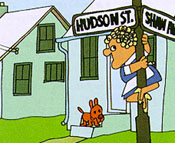 Edit for Correct Noun Endings
Edit for Correct Noun EndingsIf you can name it, it's a noun!
Noun-ending errors include missing or unnecessary plural markers and incorrectly formed plural and possessive markers. Writers can avoid noun-ending errors if they understand the following grammatical concepts:
♦ Count nouns name discrete persons, places, or things that can be quantified by a number or adjective like "one," "two," "every," or "most." They have singular and plural forms. ExamplesExamples of Count Nouns:
one computer
every man
most students
ten cats
♦ Noncount nouns (also known as mass nouns) are grammatically nondiscrete, which means they have a grammatical property that does not allow them to co-occur with words like "one," "two," "every," or "most." They have no plural form. A unit of measurement must be used (rather than a single number) to specify quantity, for example, two cups of water. ExamplesExamples of noncount (mass) nouns:
hatred
alcohol
bread
a little meat
some tuna
♦ Collective nouns name a particular class or group comprised of individual members. Problems arise with interpretation [Is the group acting in unison or are members acting individually?] and with unnecessarily pluralizing a collective noun. Examples
Collective nouns classify or define a group whose members can act in unison (singular verb) or separately as individual members (plural verb).
Examples of collective nouns that denote a whole group, class, or entity:
staff, audience, committee, team
senate, house, parliament, government
the press, the public, society, family, community
majority, minority
the military, the army, the navy, the airforce
firm, corporation, company, agency
school, faculty, class, department
♦ Group nouns differ from collective nouns in that they can never co-occur with a singular verb. A group noun is formed with THE + ADJECTIVE. ExamplesTo make an adjective a noun, place the definite article THE before it. These nouns are always plural in meaning and must take a plural verb.
the good
the bad
the indifferent
the sick
the dying
the dead
the rich
the poor
♦ Generic nouns are used to make generalizations. They are either plural without an article or singular with an indefinite article [a or an]. ExamplesGeneric nouns do not refer to any particular person, place, or thing. Their meaning is any person, place, or thing OR people, places, or things in general.
There are two ways to generalize about a group of people:
• use a plural noun without an article [Janitors do heavy cleaning work, usually during the night.]
• use an indefinite article with a singular noun [A janitor does heavy cleaning work, usually during the night.]
These generalizations mean "all janitors" or "any janitor."
Two questions will help you identify generic nouns:
• If the noun is singular, is it preceded by an indefinite article or if the noun is plural, is there no article?
• Is the statement true "in general"?
♦ Nouns that name persons or animals have singular To make a singular noun possessive, add 's.
every girl's dream
the dog's ears and pluralTo make a plural noun possessive, add S'.
the girls' accomplishments
the horses' stalls possessive forms.
♦ Nouns that name natural phenomena and abstract nouns do not usually have possessive forms as the concept of ownership does not apply. Instead, compound nouns Examples of compound nouns where one noun is part of or goes with the other. Possessive forms (as in xtree
tree trunk
car door
table leg
piano bench
living room furniture
kitchen counter
computer desktop and noun phrases with "of" are used. Click the highlighted terms for examples. Examples of noun phrases with "of" :
the light of the moon or moonlight
the setting of the sun or sunset
the state of the economy
the pain of love
the ravages of war
the danger of drugs
the edge of the sea
the eye of the storm
the ripples of the creek
Note: Occasionally, the possessive form occurs with natural phenomena and with technical terms:
• A riverbank is the ground that rises above a river's edge.
• The storm's ferocity took out several homes.
• Nicholas Negroponte, a prominent computer researcher, is trying to make technology's promise available to all children in the third world by providing $100 computers. The laptop's software is based on the freely available Linux operating system.
The possessive forms in the last sentence were used in The New York Times, November 30, 2006.
♦ Some nouns have irregular plural forms. The possessive form is 's for both the singular and plural forms of these nouns. ExamplesThe following nouns have irregular plural forms. The possessive is formed with 's for both singular and plural forms.
| singular | possessive | plural | possessive |
| man | man's | men | men's |
| woman | woman's | women | women's |
| child | child's | children | children's |
| person | person's | people | people's |
♦ Relationships-by-marriage are formed with a hyphenated suffix [relative-in-law]. The noun before the suffix is pluralized. ExamplesNouns expressing relationships through marriage:
| Singular | Plural | Sg. possessive | Pl. possessive |
| sister-in-law | sisters-in-law | sister's-in-law | sisters'-in-law |
| son-in-law | sons-in-law | son's-in-law | sons'-in-law |
| daughter-in-law | daughters-in-law | daughter's-in-law | daughters'-in-law |
| father-in-law | fathers-in-law | father's-in-law | X (There's only one) |
| brother-in-law | brothers-in-law | brother's-in-law | brothers'-in-law |